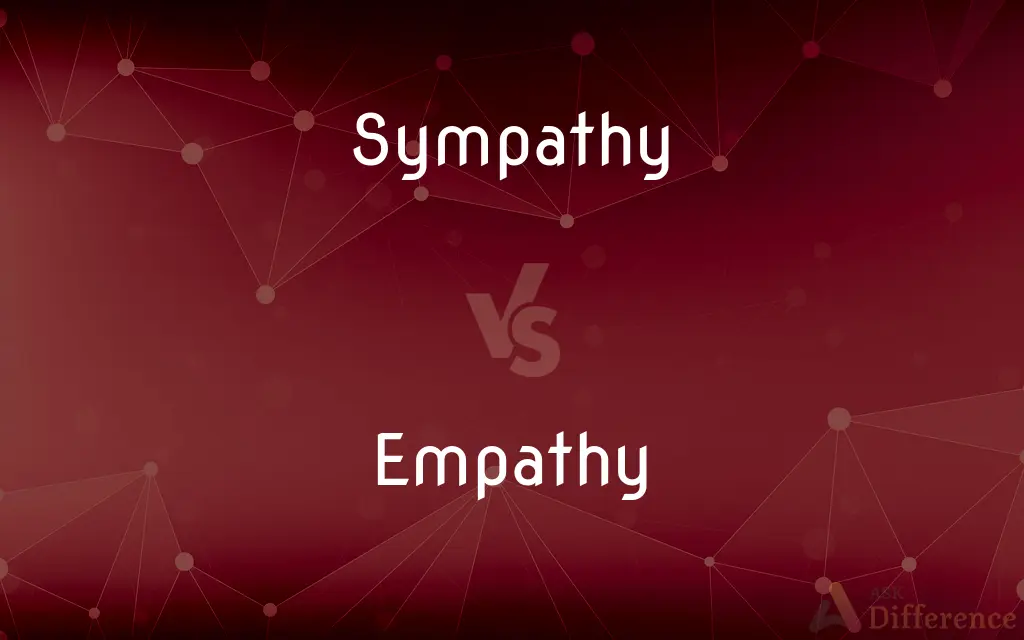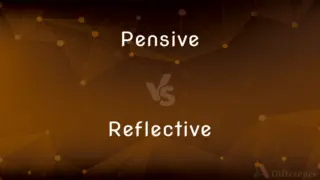Sympathy vs. Empathy — What's the Difference?
Edited by Tayyaba Rehman — By Fiza Rafique — Updated on March 20, 2024
Sympathy involves understanding from a position of sharing another's feelings, while empathy involves directly feeling what another person is feeling.

Difference Between Sympathy and Empathy
Table of Contents
ADVERTISEMENT
Key Differences
Sympathy is an emotional response where one feels compassion or pity for the hardships that another person encounters. It's a form of agreement or care for another's situation from one's own perspective. For example, expressing condolences for someone's loss demonstrates sympathy. Empathy, however, goes deeper, involving a direct connection and understanding of another's emotions as if one were experiencing them themselves. It's about putting oneself in another's shoes, feeling what they feel.
While sympathy can be viewed as feeling for someone, empathy is about feeling with someone. Sympathy might lead one to express sorrow for another's misfortune, recognizing their pain from an external viewpoint. Empathy, on the other hand, is an intimate and vicarious experience of the other's feelings, fostering a profound personal understanding of their emotional state.
Sympathy often involves a degree of distance; one does not necessarily feel the same emotions as the other person but acknowledges and reacts to the person's situation. Empathy breaks down these barriers, allowing one to experience the world from another's emotional perspective. This deeper level of connection can lead to more effective support and communication in relationships.
The expression of sympathy is generally communicated through words of comfort, such as "I'm sorry for your loss," which acknowledge someone's pain without claiming to feel it exactly as they do. Empathy might not always require words; it can be conveyed through actions, presence, or the emotional resonance that comes from truly understanding someone else's feelings.
Empathy requires a higher level of emotional intelligence than sympathy. It demands an ability to transcend one's own perspective and immerse oneself in the emotional experience of another. This is not to say that sympathy is superficial, but rather that it is a different, sometimes more accessible, form of emotional support.
ADVERTISEMENT
Comparison Chart
Definition
Feeling compassion, sorrow, or pity for the hardships of another.
Directly feeling and understanding another person’s emotions.
Nature
Emotional response with a sense of distance.
Emotional connection with a sense of immersion.
Expression
Often through words of comfort.
Can be through actions, presence, or silent understanding.
Emotional Intelligence
Involves recognizing and reacting to another's emotions.
Requires putting oneself in another's shoes to experience their emotions.
Impact
Can provide comfort and acknowledgment.
Leads to deeper understanding and connection.
Compare with Definitions
Sympathy
Offering condolences from an outsider’s perspective.
His words of sympathy comforted her during her time of grief.
Empathy
Emotional resonance with another's experience.
Their empathy for each other strengthened their relationship.
Sympathy
Compassion towards others’ difficulties.
He felt a deep sense of sympathy for the homeless during the winter.
Empathy
The ability to put oneself in another's place.
Through empathy, she understood why her sister was so upset.
Sympathy
Acknowledging another's hardship without experiencing it.
The community showed sympathy towards the families affected by the flood.
Empathy
Directly feeling what another person is experiencing.
His empathy allowed him to deeply connect with his clients' struggles.
Sympathy
Feeling pity or sorrow for someone’s situation.
She sent a sympathy card to express her sorrow for her friend's loss.
Empathy
Understanding and sharing another person’s feelings.
Her empathy for his anxiety made her a supportive friend.
Sympathy
Emotional support acknowledging someone else's pain.
Their sympathetic gestures helped her feel less alone.
Empathy
Intuitively perceiving what someone else is going through.
His empathetic response to her sadness showed he truly understood her.
Sympathy
Sympathy is the perception, understanding, and reaction to the distress or need of another life form. According to David Hume, this sympathetic concern is driven by a switch in viewpoint from a personal perspective to the perspective of another group or individual who is in need.
Empathy
Empathy is the capacity to understand or feel what another person is experiencing from within their frame of reference, that is, the capacity to place oneself in another's position. Definitions of empathy encompass a broad range of emotional states.
Sympathy
A feeling of pity or sorrow for the distress of another; commiseration.
Empathy
The ability to identify with or understand the perspective, experiences, or motivations of another individual and to comprehend and share another individual's emotional state.
Sympathy
Often sympathies An expression of such feeling
Offered her sympathies to the mourning family.
Empathy
The projection of one's own feelings or thoughts onto something else, such as an object in a work of art or a character in a novel or film.
Sympathy
Mutual understanding or feeling between people
"Like two frightened children, we sought at the same time to comfort one another, so quick was the sympathy between us" (Nicholas Meyer).
Empathy
Identification with or understanding of the thoughts, feelings, or emotional state of another person.
She had a lot of empathy for her neighbor; she knew what it was like to lose a parent too.
Sympathy
Agreement with or support for an opinion or position
The mayor is in sympathy with the proposal.
Empathy
Capacity to understand another person's point of view or the result of such understanding.
Sympathy
Often sympathies A tendency to support a position or opinion
A politician of conservative sympathies.
Empathy
A paranormal ability to psychically read another person's emotions.
Sympathy
A relationship or affinity between things in which whatever affects one correspondingly affects the other
"Continuous measurements of ionospheric densities ... showed a variation of noon ionization in sympathy with sunspot activity" (E.V. Appelton).
Empathy
MDMA.
Sympathy
(Physics) A relation between bodies such that vibrations in one body cause sympathetic vibrations in another.
Empathy
Understanding and entering into another's feelings
Sympathy
(Physiology) A relation between parts or organs by which a disease or disorder in one induces an effect in the other.
Sympathy
A feeling of pity or sorrow for the suffering or distress of another.
Sympathy
(in plural) The formal expression of pity or sorrow for someone else's misfortune.
Sympathy
The ability to share the feelings of another.
Sympathy
Inclination to think or feel alike; emotional or intellectual accord; common feeling.
Sympathy
(in plural) Support in the form of shared feelings or opinions.
Sympathy
Feeling of loyalty; tendency towards, agreement with or approval of an opinion or aim; a favorable attitude.
Many people in Hollywood were blacklisted merely because they were suspected of Communist sympathies.
Sympathy
An affinity, association or mutual relationship between people or things such that they are correspondingly affected by any condition.
Sympathy
Mutual or parallel susceptibility or a condition brought about by it.
Sympathy
(art) Artistic harmony, as of shape or colour in a painting.
Sympathy
Feeling corresponding to that which another feels; the quality of being affected by the affection of another, with feelings correspondent in kind, if not in degree; fellow-feeling.
They saw, but other sight instead - a crowdOf ugly serpents! Horror on them fell,And horrid sympathy.
Sympathy
An agreement of affections or inclinations, or a conformity of natural temperament, which causes persons to be pleased, or in accord, with one another; as, there is perfect sympathy between them.
Sympathy
Kindness of feeling toward one who suffers; pity; commiseration; compassion.
I value myself upon sympathy, I hate and despise myself for envy.
Sympathy
The reciprocal influence exercised by organs or parts on one another, as shown in the effects of a diseased condition of one part on another part or organ, as in the vomiting produced by a tumor of the brain.
Sympathy
A tendency of inanimate things to unite, or to act on each other; as, the sympathy between the loadstone and iron.
Sympathy
Similarity of function, use office, or the like.
The adverb has most sympathy with the verb.
Fault,Acknowledged and deplored, in Adam wroughtCommiseration.
Sympathy
An inclination to support or be loyal to or to agree with an opinion;
His sympathies were always with the underdog
I knew I could count on his understanding
Sympathy
Sharing the feelings of others (especially feelings of sorrow or anguish)
Sympathy
A relation of affinity or harmony between people; whatever affects one correspondingly affects the other;
The two of them were in close sympathy
Common Curiosities
Can someone be empathetic but not sympathetic?
Yes, it’s possible to understand and share another's feelings (empathy) without necessarily feeling sorrow or pity for them (sympathy).
How do sympathy and empathy differ in communication?
Sympathy is often expressed through words of comfort that acknowledge another’s pain, whereas empathy may be conveyed through a deeper understanding and shared emotional experience, sometimes without words.
What is empathy?
Empathy is the ability to understand and share the feelings of another, as if experiencing them oneself.
Why is empathy important in relationships?
Empathy fosters a deeper emotional connection and understanding, improving communication and the ability to support each other effectively.
How can one develop empathy?
Developing empathy involves actively listening, being open to understanding others’ perspectives, and practicing putting oneself in another's shoes.
How does sympathy affect the person receiving it?
Sympathy can provide comfort and a sense of being cared for or understood, even if the sympathetic person does not share the same emotional experience.
How can one show empathy effectively?
Effective empathy involves listening, validating the other person's feelings, and providing support in a way that reflects an understanding of their emotional state.
What is sympathy?
Sympathy is feeling compassion or sorrow for the hardships that another person experiences.
Can empathy be taught?
Yes, empathy can be nurtured through practices that encourage emotional understanding and perspective-taking.
What impact does empathy have on social interactions?
Empathy can lead to more meaningful and positive social interactions, as it promotes understanding, reduces conflicts, and strengthens connections.
Is it easier to show sympathy or empathy?
Showing sympathy might be easier for some, as it requires acknowledging another’s pain without needing to deeply understand or feel it, whereas empathy requires a more profound emotional connection and understanding.
What role does empathy play in conflict resolution?
Empathy allows individuals to understand and feel each other's emotions, leading to more compassionate communication and effective resolution of conflicts.
What makes empathy challenging to practice?
Empathy requires a deep understanding and sharing of another's feelings, which can be difficult if one has not experienced similar emotions or situations.
Does showing sympathy always help?
While sympathy can offer comfort, it might not always be what the other person needs or wants, especially if they seek deeper understanding or validation of their feelings.
Can a lack of empathy harm relationships?
Yes, a lack of empathy can lead to misunderstandings, conflicts, and a sense of disconnection, harming the relationship.
Share Your Discovery

Previous Comparison
Pensive vs. Reflective
Next Comparison
Was vs. WereAuthor Spotlight
Written by
Fiza RafiqueFiza Rafique is a skilled content writer at AskDifference.com, where she meticulously refines and enhances written pieces. Drawing from her vast editorial expertise, Fiza ensures clarity, accuracy, and precision in every article. Passionate about language, she continually seeks to elevate the quality of content for readers worldwide.
Edited by
Tayyaba RehmanTayyaba Rehman is a distinguished writer, currently serving as a primary contributor to askdifference.com. As a researcher in semantics and etymology, Tayyaba's passion for the complexity of languages and their distinctions has found a perfect home on the platform. Tayyaba delves into the intricacies of language, distinguishing between commonly confused words and phrases, thereby providing clarity for readers worldwide.
















































